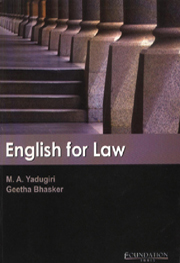Book contents
- Frontmatter
- Preface
- Contents
- A Note to the Student
- Notes to the Teacher
- 1 Nature of Law
- 2 Crimes and Civil Wrongs
- 3 Command of Language in the Profession of the Law
- 4 Plain Language and the Law
- 5 The Indian Constitution
- 6 The Impact of Technology on the Practice of Law
- 7 The International Court of Justice
- 8 Application of Precedents
- 9 Statutory Interpretation
- 10 Legal Reasoning
- 11 Plaints and Writs
- 12 Judgment
- 13 Of Defamation
- 14 Consumer Protection (Amendment) Act, 1993
- 15 The Information Technology Act, 2000
- 16 Universal Declaration of Human Rights
- Answer Key
16 - Universal Declaration of Human Rights
Published online by Cambridge University Press: 26 October 2011
- Frontmatter
- Preface
- Contents
- A Note to the Student
- Notes to the Teacher
- 1 Nature of Law
- 2 Crimes and Civil Wrongs
- 3 Command of Language in the Profession of the Law
- 4 Plain Language and the Law
- 5 The Indian Constitution
- 6 The Impact of Technology on the Practice of Law
- 7 The International Court of Justice
- 8 Application of Precedents
- 9 Statutory Interpretation
- 10 Legal Reasoning
- 11 Plaints and Writs
- 12 Judgment
- 13 Of Defamation
- 14 Consumer Protection (Amendment) Act, 1993
- 15 The Information Technology Act, 2000
- 16 Universal Declaration of Human Rights
- Answer Key
Summary
Article 1
All human beings are born free and equal in dignity and rights. They are endowed with reason and conscience and should act towards one another in a spirit of brotherhood.
Article 2
Everyone is entitled to all the rights and freedoms set forth in this Declaration, without distinction of any kind, such as race, colour, sex, language, religion, political or other opinion, national or social origin, property, birth or other status.
Furthermore, no distinction shall be made on the basis of the political, jurisdictional or international status of the country or territory to which a person belongs, whether it be independent, trust, non-self-governing or under any other limitation of sovereignty.
Article 3
Everyone has the right to life, liberty and the security of person.
Article 4
No one shall be held in slavery or servitude; slavery and the slave trade shall be prohibited in all their forms.
Article 5
No one shall be subjected to torture or to cruel, inhuman or degrading treatment or punishment.
Article 6
Everyone has the right to recognition everywhere as a person before the law.
Article 7
All are equal before the law and are entitled without any discrimination to equal protection of the law. All are entitled to equal prptection against any discrimination in violation of this Declaration and against any incitement to such discrimination.
- Type
- Chapter
- Information
- English for Law , pp. 512 - 534Publisher: Foundation BooksPrint publication year: 2005



